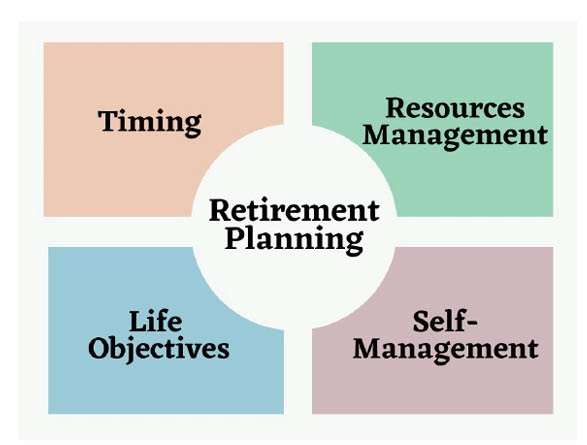Retirement planning – The psychological realities (V)
Last week, we took up a few of the triggers of varied emotions in retirees and about-to-retire individuals. Today, we will conclude with a few more of the triggers. Health concerns: Obviously, individuals are different and so are their health conditions. For some, they live into their sixties and seventies with little health challenges. For […]

The Retirement Planner
Last week, we took up a few of the triggers of varied emotions in retirees and about-to-retire individuals. Today, we will conclude with a few more of the triggers.
Health concerns: Obviously, individuals are different and so are their health conditions. For some, they live into their sixties and seventies with little health challenges. For many others, however, they begin to face heath challenges ‘early’ in life. Whilst at work, individuals can take care of themselves because they have sufficient funds or may have access to excellent medical services. This is a big deal and if sufficient funds and/or medical services may not be available after retirement, there will be legitimate concerns. However, even if funds and/or medical services might be available after retirement, the reality is that for most people, health may begin to deteriorate with age. This is a major concern that about-to-retire and retirees face and which may cause anxiety.
Loss of confidence and sense of self-worth: Our work and business make it possible for us to add value to our lives and the lives of others. This gives us a sense of self-worth and importance. But when we retire, two things might happen: First, the official authority we had that we leveraged to be of value would be taken away. Second, our financial and physical capacities might be weakened. This tends to be the predominant tendency, though by no means the general situation. I mean, retired Lt. Gen. Theophilus Y. Danjuma is a good example of a person who has remained of great value after retirement. His TY Danjuma Foundation is providing support running into billions of Naira to individuals, schools, and communities. Nonetheless, the fears that our capacities to remain of value might be impeded could negatively affect our levels of confidence and self-worth, thereby triggering apprehensions about retirement.
Economy and Inflation: I define my Nigerian generation as those of us born between 1960 and 1975. We witnessed our parents buy new cars for as low as N4,000.00 as ‘recently’ as 1979. However, as we went through school and started to work, new cars began to sell for about N20,000.00. As we inched into the Structural Adjustment Program (‘SAP’) years, Nigerians began to import used vehicles from Europe and North America for about N40,000.00. Today we buy both used and new cars for several millions of Naira.
- Labour presses on, to decide on strike
- Mixed reactions trail Tinubu’s Independence Day anniversary speech
Over time, inflation and periodic economic downturns are almost a natural phenomenon in most countries. On the other hand, our retirement benefits may be in fixed Naira values and other incomes might not be as assured. This means our purchasing power might weaken in retirement over time. Understandably, therefore, likely future economic downturns and inflation are specific factors that can cause concerns for many about-to-retire persons.
Debt: Some individuals have debt overhangs as they approach retirement. They have probably borrowed late for housing or business purposes. If a person is retiring, they will need to either make a bullet payment to discharge their obligations in full or commit part of their retirement benefits and other sources of cash into periodic partial repayments. Any of the two options will take cash from the retiree, perhaps without supplemental cash inflows. Hence, debt can cause concerns as individuals approach retirement.
Fear of the unknown: As mentioned last week, our work and business are greater stabilisers in our lives. They give us a lot of comfort and security, which we don’t necessarily take for granted. The thought of leaving our jobs and businesses, therefore, brings all sorts of fears, real and imagined, into our heads. For many, we can’t even pinpoint exactly what we are afraid of, but like little children, we just believe something fearsome is lurking somewhere in the dark.
Fear of death: It will be interesting to plot a death probability distribution graph at various age bands for a particular Nigerian generation. Depending on which Nigerian generation we take a look at, we may or may not have a small bump at the beginning (ages zero to seven) due to infant mortality. From age seven to about forty, there will likely be a steady but not necessarily aggressive increase in deaths as members of the generation get killed in road accidents, criminalities, civil crises, diseases, poor medical facilities, etc. It may be from about age forty to seventy that a wide ‘n’ will show up, capturing most deaths for the generation (perhaps largely due to medical issues). From age seventy to a hundred, there will likely be relatively fewer deaths (due to ageing and medical issues) as the remnants of the generational population gets depleted.
The point is that as we age and race towards retirement, we begin to attend more funerals of classmates, colleagues, and associates of our generation. This may bring a feeling of a ‘fast-approaching’ inevitable end, with retirement as a road pointer in that direction. Consequently, retirement brings mortality and death anxieties for many retirees and about-to-retire individuals.
This brings us to the end of this series. At the appropriate point, we will take up how these emotions can be processed so that an individual can be a well-adjusted retiree. In the interim, we will, next week, take up the various transition phases prior to, at and into retirement.
